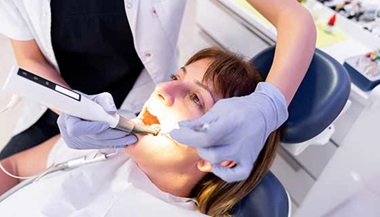Halitosis (Bad Breath)
What is halitosis?
Halitosis is an oral health problem where the main symptom is bad smelling breath. In most cases, finding the cause of the bad breath is the first step toward treating this preventable condition.
What causes bad breath?
There are many causes of bad breath, just as there are many sources of bacteria in the mouth. Halitosis may be caused by the following.
Certain foods
The things you eat are linked to your oral health, including your breath. Items, such as garlic and onions, or any food, are absorbed into the bloodstream. Until that food leaves the body, it may affect your breath.
Poor oral health care
Without correct and regular brushing and flossing, and routine dental exams, food stays in the mouth. This is a breeding ground for bacteria. Food that collects on the teeth, gums, and tongue may rot. This causes an unpleasant odor and taste in the mouth.
Incorrect cleaning of dentures
Dentures that are not cleaned correctly may be collecting bacteria, fungi, and remaining food particles. All of these cause bad breath.
Odor-causing bacteria on the tongue
Certain bacteria on the back of the tongue can interact with amino acids in foods and make smelly sulfur compounds.
Gum (periodontal) disease
One of the main symptoms of this gum disease is bad-smelling breath and an unpleasant taste in the mouth. This condition needs care right away by an oral health provider.
Dry mouth (xerostomia)
This condition is often a key part of halitosis. When your mouth doesn’t make enough saliva, your mouth can’t clean itself. It can’t remove debris and particles left behind by food. Dry mouth may be caused by certain medicines. It may also be caused by a salivary gland problem or by always breathing through the mouth instead of the nose.
Tobacco products
Tobacco products, such as cigarettes, cigars, smokeless tobacco, and snuff, stain the teeth and put the body at risk for many diseases. But they also help cause bad breath. Tobacco users also are at higher risk for:
-
Gum disease
-
Loss of ability to taste
-
Irritated gums
-
Oral cancer
A health condition
Bad breath may be a symptom of any of the following conditions. See your healthcare provider for a diagnosis.
-
Respiratory infection
-
Infection of the nose, windpipe, or lungs
-
Chronic bronchitis
-
Postnasal drip
-
Chronic sinusitis
-
Diabetes
-
Digestive disorder
-
Liver or kidney disorder
What are the symptoms of halitosis?
The main symptom of halitosis is a bad odor from the mouth. The odor can be worse in the morning or after smoking, drinking coffee, or eating certain foods, such as garlic.
How is halitosis diagnosed?
Dentists usually diagnose bad breath. The diagnosis is based on your health history and mouth odor during the dental exam. The entire mouth is checked to see if a cause can be found, such as an infection. If the dentist can’t find the cause, they will refer you to your primary healthcare provider.
How is halitosis treated?
Treatment depends mainly on the cause of the condition.
| Cause | Possible treatment |
| Poor oral healthcare | Your dentist will often treat the cause of the problem if your bad breath is from poor oral healthcare. |
| Gum disease | Your dentist may treat the gum disease. Or they may refer you to an oral specialist (periodontist). Cleaning by a periodontist often helps to remove the bacteria, tartar, and plaque that have built up. This will ease the inflammation at the gum line. |
| Plaque buildup | Your dentist or periodontist may tell you to use an antimicrobial mouth rinse. You may also be told to brush your tongue gently each time you brush your teeth. This will help remove odor-causing bacteria. |
| Health condition | Finding and treating an existing health condition may get rid of the bad breath. |
What can I do to prevent halitosis?
Halitosis can be prevented or decreased if you:
-
Brush and floss your teeth at least twice a day.
-
Brush your tongue, cheeks, and the roof of your mouth. Most bad breath bacteria live on the tongue. So brushing or scraping the tongue can make a big difference in your breath.
-
If you have dentures, take them out at night. Clean them completely before putting them back in your mouth. Talk with your dentist before using deodorizing sprays or tablets. Some only mask the odor for a short time.
-
If you smoke, quit. Ask your healthcare provider for help. You will have better smelling breath and a healthier body overall.
-
Keep your saliva flowing by eating healthy foods that make you chew. Carrots and apples need a lot of saliva. You can also chew sugar-free gum or suck on sugar-free candies. If you still don’t have enough saliva to keep your mouth moist, your dentist may suggest artificial saliva.
-
Visit your dentist on a regular basis. Regular checkups can find problems, such as gum disease, infections, and dry mouth. If you have bad breath and the dentist can’t find a cause, you may be referred to your primary healthcare provider for more follow-up.





